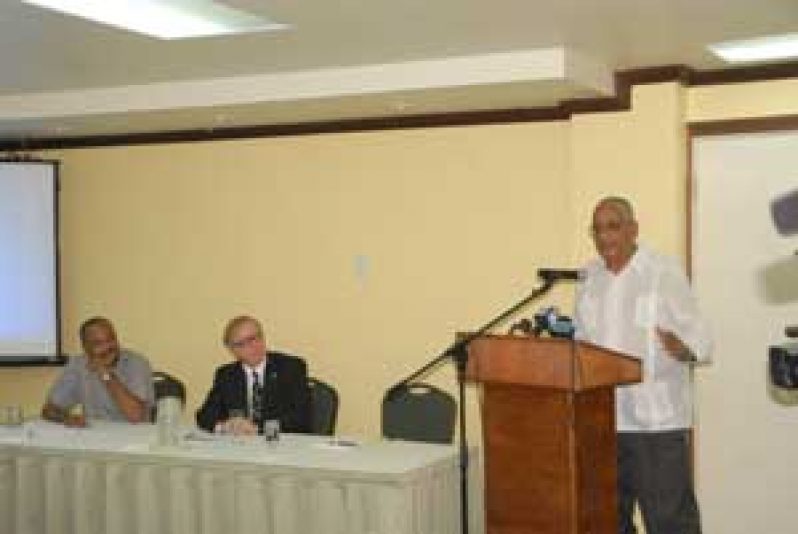DEMOCRATIC governance, prosperity, and security were highlighted as some of the benefits to be obtained by CARICOM (Caribbean Community) States once regional integration is pursued and achieved.
 Representative Plenipotentiary to CARICOM, David Devine, said these were some of the possibilities, in his opinion, that can be achieved if an integrated Caribbean becomes a reality. In fact, he expressed confidence that a unified Caribbean will soon be realised.
Representative Plenipotentiary to CARICOM, David Devine, said these were some of the possibilities, in his opinion, that can be achieved if an integrated Caribbean becomes a reality. In fact, he expressed confidence that a unified Caribbean will soon be realised.
Devine, also Canadian High Commissioner to Guyana, was delivering the opening address at a seminar on regional integration organised by the Institute of International Relations (IIR) at the University of the West Indies, the Guyana Alumni Group and the Guyana Defense Force (GDF).
The seminar, held at Cara Lodge on Quamina Street in Georgetown, covered such topics as small states in the integration process; sovereignty in the Commonwealth Caribbean and its impact on regional integration; climate change and the environment; UNASUR and its implications for CARICOM; and the social dimension of regional integration, security cooperation in the hemisphere, among others.
In attendance were representatives of the Ministry of Foreign Affairs, the Ministry of Education, and the CARICOM Secretariat. Members of the diplomatic corps, GDF, the Guyana Police Force, professors, current students and alumni were also there.
With regard to the benefit of democratic governance, Devine said integration would promote such by virtue of a shared political infrastructure. “Democratic governance is one of Canada’s key areas of focus in the hemisphere. I do believe that an open and ongoing discussion in the Caribbean would revitalise regional democracy. And with democracy comes human rights protection and greater prosperity.”
As regards prosperity, Devine believes that a lack of greater economic integration is standing in the way of huge gains for the Caribbean. It is clear that the Caribbean is currently losing out on significant economic growth. In order for trade to work at an optimal level, it has to be between equal parties.
“Caribbean states individually may not be the most powerful nations in the world; but with an integrated market, the region, as a whole, would benefit from greater bargaining power in the international arena.”
As for security, Devine said the Caribbean faces a number of security challenges that can only be met effectively with greater coordination and synchronisation of approaches. So there is much to do, Devine said, but he believes that the Caribbean is equal to the task.
Challenges
One of the main challenges to regional integration, Devine pointed out, has to do with the fear of losing territorial integrity, fear of losing sight of cultural distinctiveness, and fear of losing profits for the states that might be better off, economically speaking, than others.
However, he said there is no need to subsume one’s borders or cultural identity to join together with others. “France does not cease to be France, just because it is part of the European Union. Secondly, a single market can only serve to cut the costs to individual governments.
The second hurdle relates to the first in a way. It is “this image of separateness” that Devine said he perceives in the Caribbean. “But I am under the impression that it is superficial. Deep down, the Caribbean people know they are one. I can best convey the sort of unification I mean with just five words: the West Indies Cricket Team.
“Do you think that Sri Lanka cares which particular country Chris Gayle is from? No. It doesn’t matter who comes from which country. All that matters is that they are the West Indies and Sri Lanka better watch out.”
The final hurdle, Devine posited, surrounds political will. “Governments and multilateral organisations cannot do everything. For integration to succeed, the private sector, academia, unions, the public and other stakeholders need to see the benefits and be a part of its implementation.”
IIR Senior Lecturer Mark Kirton, in his welcome remarks, offered that the common argument is that this new round of regional integration efforts could complicate efforts by creating overlap and adding pressure to small states like those in the Caribbean.
“We feel, indeed that every opportunity must be taken to provide new perspectives and to present the cutting edge kind of research which we find particularly lacking in the Caribbean context.
“The hemisphere today is witnessing some significant reconfigurations and we see a growing recognition by states of the need to speak with one voice,” Kirton stated.



.jpg)








